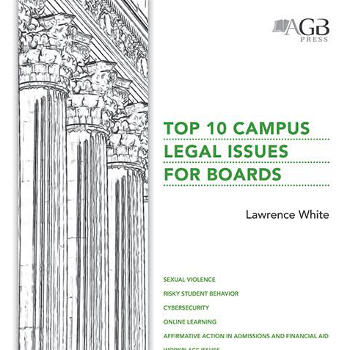 |
| Top 10 Campus Legal Issues for Boards by Lawrence White (Association of Governing Boards of Universities and Colleges, 2015, 52 pp., $36). |
"A bit of prevention is worth tens of thousands of dollars’ worth of cure,” writes Lawrence White in a recent blog post. His new 52-page booklet — Top 10 Campus Legal Issues for Boards — is a concise and readable guide that reminds trustees of their legal responsibilities, outlines specific areas of risk, and includes ample bits of prevention. Currently vice president and general counsel at the University of Delaware, White brings to the project more than 30 years of experience as an attorney practicing in academic and nonprofit settings.
The monograph’s top ten topics, presented in random order, are sexual violence; risky student behavior; cybersecurity; online learning; affirmative action in admissions and financial aid; workplace issues; statutory and regulatory compliance issues; federal cost accounting and effort reporting; construction and deferred maintenance; and transparency, ethical conduct, and behavior. Each four- or five-page chapter covers a single issue with its contents packaged in a consistent, easy-to-follow way. Readers with specific concerns can skim or skip among four subheadings:
Although the booklet directly addresses trustees, legal counsel and compliance officers will find it a helpful review of the risks facing institutions today. As a teaching tool, it updates stakeholders with current statistics and information about employer mandate rules in the Affordable Care Act, the Fair Labor Standards Act, and revised requirements for employing veterans and disabled persons.
White acknowledges that “trustees perform their work against the backdrop of a constantly shifting environment of new laws, new court decisions, and changing compliance priorities.” His best advice, shared in his blogpost, is familiar: Talk with your institution’s attorney before, not after, a legal problem surfaces because “what the law permits today, it may prohibit tomorrow.” His new publication, devoid of legal jargon, serves as a timely primer for those discussions.